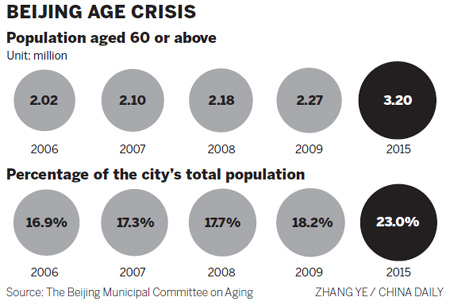Politics
Graying population to get more services
Updated: 2011-07-25 07:49
By He Dan (China Daily)

City plans new nursing homes, local canteens for the elderly
BEIJING - As the capital's population rapidly ages, the government will offer more help to its gray-haired citizens, including a monthly subsidy of 1,100 yuan ($171) for those who can't live independently or afford nursing home fees, according to a senior civil affairs official.
Beijing will also accelerate the construction of nursing homes, which cannot keep up with demand, and encourage the private sector to provide more affordable services in retiree communities, said Wu Shimin, director of the Beijing Municipal Bureau of Civil Affairs.
Wu gave a keynote speech at a conference on Friday, which laid out the municipal government's 12th Five-Year Plan (2011-2015) for older residents.
Statistics from the Beijing Municipal Committee on Aging show that there were about 2.27 million people above the age of 60 in the city as of the end of 2009, or 18.2 percent of the population.
The 60-plus population of Beijing is forecast to reach 3.2 million in 2015.
And these statistics don't even include those without a Beijing hukou (permanent residency permit).
Nursing homes in the capital only have 72,000 beds, or about three for every 100 senior citizens, Wu said.He pledged that the government will work toward the goal of an annual increase of 10,000 beds in the next five years.
Jin Kang, an 80-year-old resident of Chaoyang district, signed up two years ago for a place in a public nursing home but didn't get one because of fierce competition.
Services in a private facility near his home are better, but it charges 10,000 yuan a month, far beyond the means of Jin, who lives on a monthly pension of 3,000 yuan, according to a report published on Sunday in the Beijing News.
To enable more senior citizens to afford nursing home places, the government will offer subsidies of 800 yuan to 16,000 yuan for every new bed built by any private-sector nursing home, Wu said. The facilities will also receive a monthly subsidy of at least 200 yuan for each resident.
Moreover, the bureau of land and resources will allocate 80 hectares of land for the construction of more nursing homes, Wu revealed.
Realizing that many older people have trouble cooking for themselves, the municipal government will aim to establish 500 community-based canteens in 2011. It intends to expand this service through 2015 by setting up at least one canteen for the elderly in every 800 households.
Yin Shichang, a resident in his 80s in Haidian district, said the canteen in his neighborhood has made his life much easier.
"It's too hot and unsafe to cook in summer. Besides, I worry about the hygiene problem of eating in restaurants," Yin said.
"Now, the canteen in our community has relieved my big burden by providing dishes to suit my taste and even delivering the food to my home if I fall ill."
In an attempt to regulate paid services for senior citizens, the bureau of civil affairs has released a guidebook listing the maximum charges of 110 items.
For example, a community-based canteen cannot charge more than 5 yuan for breakfast, 15 yuan for lunch or 12 yuan for supper. It also states that charges for such part-time services as cooking and shopping should be less than 20 yuan an hour.
China Daily
(China Daily 07/25/2011 page4)
E-paper

Ringing success
Domestic firms make hay as shopping spree by middle class consumers keeps cash registers ringing in Nanjing
Mixed Results
Crowning achievement
Living happily ever after
Specials

Ciao, Yao
Yao Ming announced his retirement from basketball, staging an emotional end to a glorious career.

Going the distance
British fitness coach comes to terms with tragedy through life changes

Turning up the heat
Traditional Chinese medicine using moxa, or mugwort herb, is once again becoming fashionable
